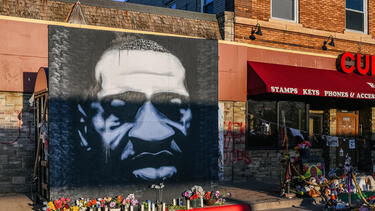How George Floyd’s Murder Galvanized Corporate America
A year after the killing sparked a wave of protest, Yale SOM leadership expert Jeffrey Sonnenfeld sees signs of a lasting change in corporate attitudes about racial justice.

A mural at George Floyd Square in Minneapolis, where Floyd was murdered in June 2020. Photo by Brandon Bell/Getty Images.
This commentary originally appeared in Politico.
The outrage over George Floyd’s murder was a big wake-up call for America’s CEOs. There were plenty of moral reasons for them to take action, but it almost immediately became clear that there were plenty of business reasons to do so as well: In the month after the killing, survey data showed an overwhelming majority of the American public wanted executives to speak up and to act on racial inequality in the United States.
Many business leaders did just that. At a Yale CEO Forum last spring, Ken Frazier, the CEO of Merck and one of four Black CEOs in the Fortune 500, spoke personally about Floyd, saying, “This African American man could be me or any other African American man” and terming the killing “a defining moment for our country when it comes to the issues of race.” Soon afterward, Frazier and then-IBM CEO Ginni Rometty organized several dozen other CEOs and more than $100 million to launch the OneTen workforce initiative to secure one million good jobs for Black workers without a college degree.
Other programs followed—real efforts with real money behind them. Goldman Sachs has just begun funding recipients of its newly launched One Million Black Women initiative, which commits $10 billion in direct investment capital and $100 million in gifts to address racial and gender bias suffered by Black women and exacerbated by the pandemic. Doug McMillon of Walmart has similarly invested $100 million into such community economic development initiatives. Target CEO Brian Cornell has committed to send $2 billion to Black owned businesses. Brian Moynihan of Bank of America just announced he was raising last year’s commitment of $250 million for investment in minority entrepreneurs to $350 million.
Of course, if you take a hard look at who really controls all that money and all those decisions, it’s clear the business community still has a long way to go. Less than 2 percent of top executives at the 50 largest companies are Black. But certain actions by pillars of American industry suggest meaningful change. As one example, this year Walmart showed a significant increase in officers of color to nearly 25 percent, and 55 percent of the company’s new hires were people of color. Similarly Target reports that more than half of its approximately 1,900 stores are led by female store directors and more than a third are led by people of color. In 2017, following police killings of unarmed Black citizens, PriceWaterhouse Coopers CEO Tim Ryan launched CEO Action for Diversity, an initiative where executives commit to diversifying their work forces and sharing best practices. This summer, more than 1,600 CEOs signed up.
There also appears to be a new appetite to listen. Many CEOs convened company-wide town halls in the wake of the protests. Brian Cornell of Target, David Solomon of Goldman Sachs, Doug Parker of American Airlines, Mary Barra of GM, Arvind Krishna CEO of IBM, and Johnson & Johnson’s Alex Gorsky told me they’ve had such dialogues for years but that the tone has changed precipitously in the last year towards far more candor.
Should we take this all with a grain of salt? I’ve been studying American businesses and CEOs for 45 years, and I’ve seen plenty of meaningless virtue signaling from this community—like the insincerity of some companies that joined the sustainability movement for more cosmetic reasons, without actually making meaningful changes to their climate footprints. Ford Foundation CEO Darren Walker warned us at Yale/Korn Ferry forum on racial justice this year that it is premature to celebrate progress, that the frequent feel-good gala dinners on racial justice of the past are insufficient, telling me, “We have been unable to move from performative acts to real, sustained commitment to change.”
But I think these recent examples are something different. And I’m not alone. Mellody Hobson, co-CEO of Ariel Investments, chairwoman of Starbucks and one of just a few Black female CEOs, is also optimistic that the changes are real, calling this shift in corporate attitude a new chapter in the American push for civil rights. At the Yale/Korn Ferry forum, she said, “Corporate America has learned very quickly that social unrest and economic inequality are bad for business.” Of course, it’s too soon to know for real. As PepsiCo’s former CEO Indra Nooyi says, the true test will be if these changed dynamics take hold when we are out of the pandemic and the energy behind the protests has died down. Only then will we know if this racial justice mission in corporate America has led to lasting change.